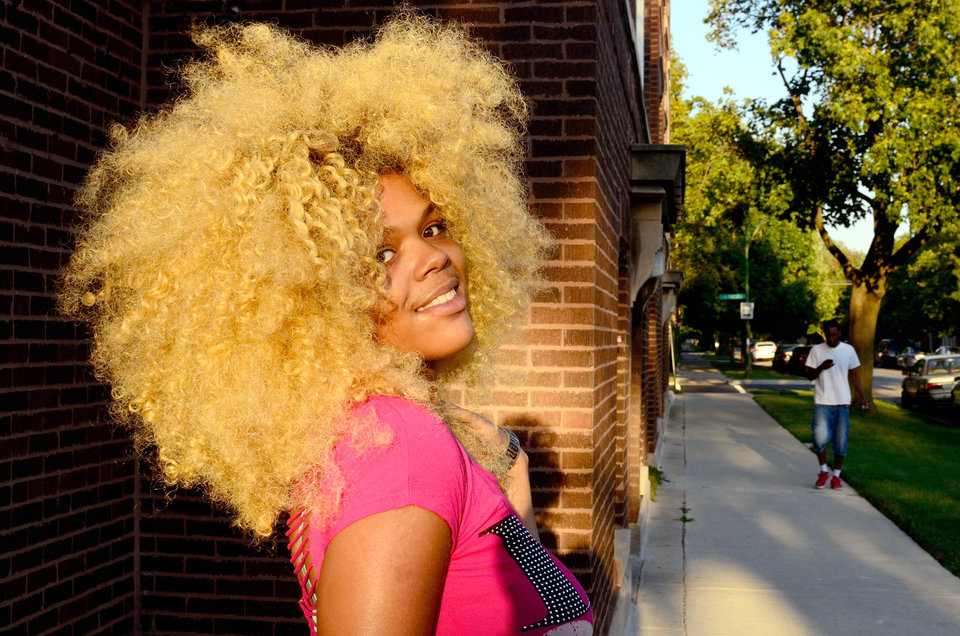
Everyday Englewood: Artist and Activist Tonika Lewis Johnson Speaks Up
In a world full of social media hype and fake news, how hard is it really to change people’s opinions and perceptions of the world around them? Turns out, it’s a lot harder than one might think. Most Americans would agree that the press often showcases violence to get a reaction from their viewers and boost their ratings. This is rubbernecking at it’s finest: I don’t want to look, but I also don’t want to look away. But, what if all this violence was said to be taking place just down the street, in your neighborhood? Would you sit by and allow newsreaders to convince the nation (and even some of your neighbors) of something that is not intrinsically true? Activist and artist Tonika Lewis Johnson refused to do so.
In fact, Johnson’s latest exhibition “Everyday Englewood,” currently on view at the Loyola University Museum of Art (LUMA), is centered on changing the Chicago neighborhood of Englewood’s reputation. After being blasted and sensationalized in the news, Johnson was able to provide a different portrait of this South Side community with images that show a tender, loving, and fundamentally happy Englewood—a far cry from the neighborhood’s cruel and vicious portrayal in the media.
Ashuni L. Perez was able to catch up with the artist, who was one of Chicago Magazine‘s Chicagoans of the Year in 2017, while she was in Washington, D.C. lobbying with R.A.G.E.—a powerful acronym alluding to the Resident Association of Greater Englewood, a resident-driven association established to build relationships with fellow residents, Englewood’s public officials, business owners and organizations, that Johnson co-founded—to talk about the making of the photography series and how the exhibition has impacted members of Englewood’s community.
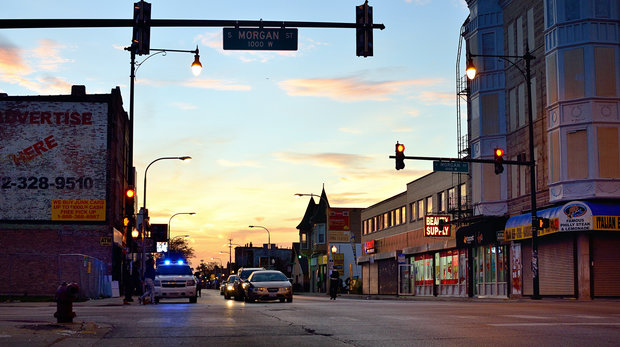
Tonika Lewis Johnson, Everyday Englewood, 63 Morgan
“Everyday Rituals” has received a lot of well-earned praise and recognition. How does it feel to have helped change people’s perceptions about where you grew up?
Tonika L. Johnson: Of course it’s flattering to have my work recognized by a larger public beyond my home community of Englewood. However, at the same time, the praise and response to my work from Englewood residents and others throughout the city, confirmed a few ugly truths that were obvious to us who live in Chicago’s black neighborhoods: First, there is an overwhelming absence of intentional, dignified, artistic photography and imagery depic
ting the daily lives of residents in Chicago’s predominantly black communities unattached to crime or poverty. Second, there is no platform in Chicago for photographers of color whose images center on black subjects in black neighborhoods. And third, the media’s constant, crime-focused coverage of Englewood did in fact perpetuate the negative perception Chicago residents had of Englewood and communities like it. Overall, I’m most honored and proud to have shown my community a more accurate reflection of itself as beautiful and tender.
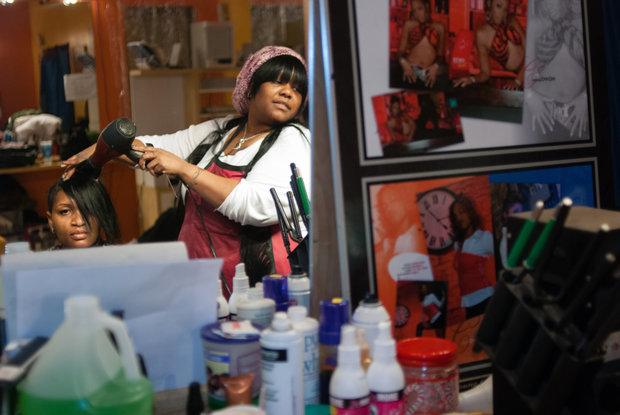
Tonika Lewis Johnson, Everyday Englewood, Beauty Shop
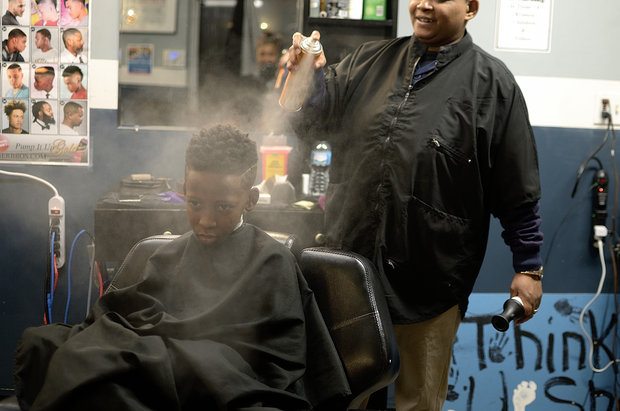
Tonika Lewis Johnson, Everyday Englewood, Barber Shop
The photos in the series are very visceral; their vibrant colors and ability to encapsulate a feeling make them almost magnetic. What makes an “everyday” moment worthy of capturing in time?
Tonika L. Johnson: I think almost all everyday moments are worth capturing! If not for artistic purposes, definitely for archival, historical, and educational purposes. Honestly, there are actually too many reasons an everyday moment is worthy of capturing: The aesthetic pleasure it gives, the natural composition of a moment, the color, the power of the emotion being demonstrated, the significance that moment has within our cultural history, the ability it has to inform others in the future how life was lived. How I personally feel when I’m photographing influences which one of those reasons I might focus on. This is exactly why I used to tell my elementary photography students that what and how you photograph a moment or a person actually says more about you as a photographer and person than it does about your subject.
You have an ability to capture very intimate portraits of people. Who are some of your favorite subjects?
Tonika L. Johnson: I love photographing people in my community and people in communities that remind me of home, primarily because these people and these communities now have the luxury of being photographed in a way that captures the full spectrum of human spirit. When people want to talk about Englewood and communities like it, they only want to document it from a damaged point of view. I thoroughly enjoy finding the value, the beauty, the meaning, and the moment of every spectrum of life that goes on in Englewood.
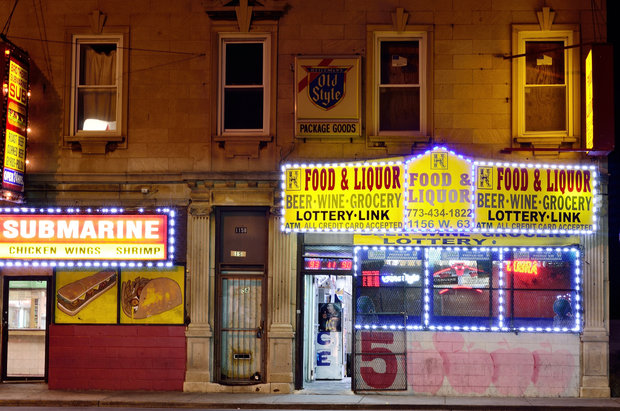
Tonika Lewis Johnson, Everyday Englewood, 63rd Racine
What kind of feedback have you gotten from your subjects in Englewood? Were people initially happy to be a part of the project?
Tonika L. Johnson: The immediate reaction is: “Are you doing a story for a newspaper?” So, that’s a part of the practice that I really enjoy because there’s value in me telling them, “No, it’s not part of a news story. I’m doing it because I think this moment is nice.” Me having that conversation with them is part of changing their mindset about how people view them. Some of the people who were included in the billboard project were so proud. They were so uplifted and almost relieved [as though to say], “Wow, finally someone sees me in this way.” It requires a level of trust, because there’s no written story attached to it to provide context. They are literally trusting me to photograph some essence of them that they approve of.—and when they see the photo, they feel validated.
A range of different locations, from sidewalks to barbershops to kitchens, are displayed in the series. Is there anywhere you haven’t photographed yet that you would like to?
Tonika L. Johnson: I haven’t even scratched the surface of things I want to photograph yet. Particularly with African American girls between the ages of fourteen and twenty-one. Where are the images of this group? I don’t know where they go or what they do. Also, I want this group to know that the life they are living has value and is worth being documented. Then, I want to photograph men, but not focus on location. I want to photograph how different demographics can change a space and activate it differently. I also want to photograph bus stops between three o’clock and six o’clock because it’s a strange time of day. Englewood looks different then. Everywhere, I think, looks different then.
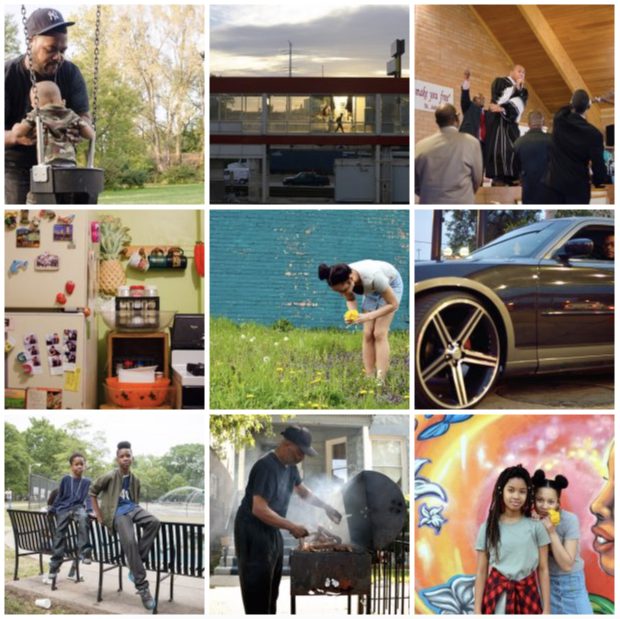
Tonika Lewis Johnson, Everyday Englewood
How has Englewood changed since the series, press and billboards came out? Is there a noticeable feeling in the streets?
Tonika L. Johnson: In the community there’s a different sense of pride and hope because of the attention that has been brought to Englewood. It’s definitely had a positive impact. It’s also transformed the way the community knows it can utilize art and photography to elevate and advance some of the issues in Englewood. Not to mention, it’s given a real sense of ownership over our narrative and feeling that we can take back our community’s narrative.
The way you combine activism and art is truly inspiring. Did one come before the other? Or did they begin at the same time?
Tonika L. Johnson: One definitely came before the other and they evolved separate from each other. I had no intentions or plans to merge them because I didn’t know how to. I took my first photography class when I was fourteen, and at that time, it was all film. Then there was the shift between film and digital, but it was all still very expensive. So, I slowed down with photography. Then, I got married, had kids, and went on into my career path that led me into specific community service. I majored in journalism, and so I took a lot of photojournalism classes and at that time, there was a lot of talk of large media outlets not being able to support staff photographers. When they finally let [the staff photographers] go, I felt that photojournalism wasn’t an option anymore.
I just knew that I liked taking a certain kind of photographs. I didn’t know where they could go but I kept taking them and taking them. It was activists and engaged residents of Englewood that told me, “This is what we are trying to tell people that Englewood is like!” It was only a couple of years ago that I saw how my work aligned with a community movement.
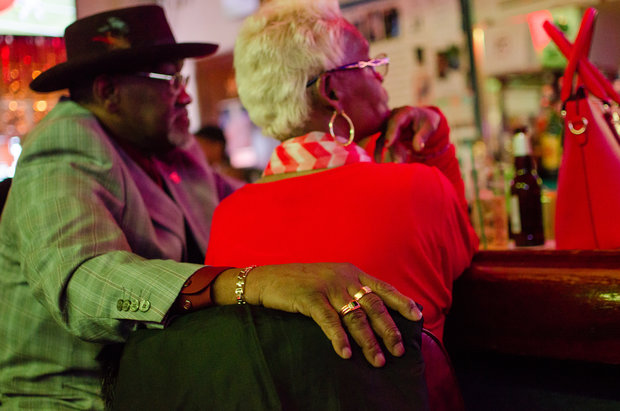
Tonika Lewis Johnson, Everyday Englewood, Lasting Love
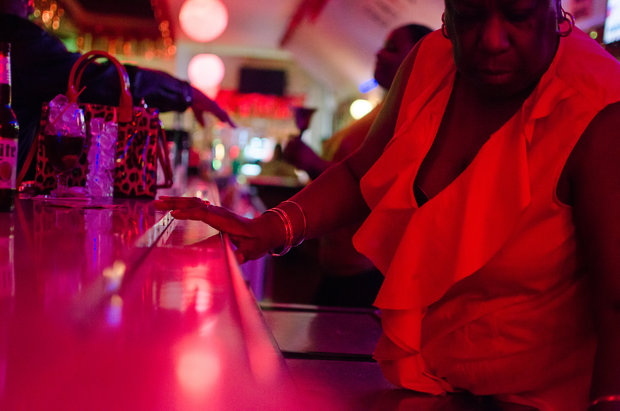
Tonika Lewis Johnson, Everyday Englewood, Giver of Spirits
Share a good piece of advice based on your own life experience to creative people out there.
Tonika L. Johnson: I am committed and I want to stay in my neighborhood because I want to remain visible and act as a point of reference for young artists in Englewood. I want to become a source of encouragement for them—the kind of encouragement that was given to me from friends and later on from the community. But, in order the get encouragement and improve your craft, you have to have a platform to be able to show it. So, I want to be able to assist young artists from Englewood in having that platform so they can get all of the input and encouragement that they need to develop as artists. I will say, before all of that happens, continue to do your craft. Regardless of where you do or don’t think it can go. You only get better by doing. And, don’t be afraid to show your work. Definitely don’t feel like your art isn’t valuable. Don’t do the world a disservice by not making your art.
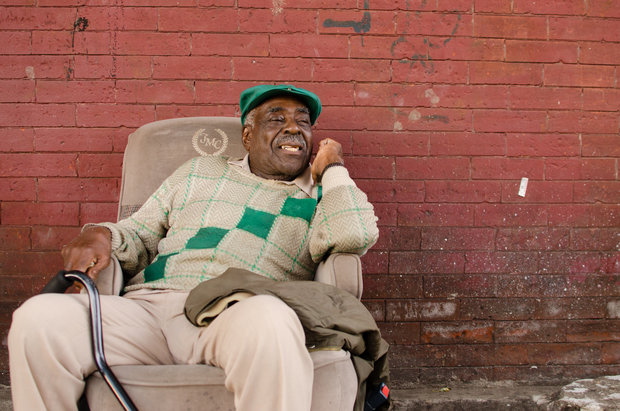
Tonika Lewis Johnson, Everyday Englewood, Lil Willie
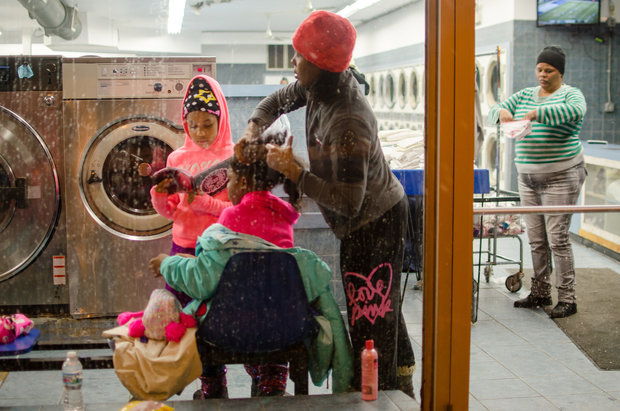
Tonika Lewis Johnson, Everyday Englewood, Laying of Hands
Let’s talk about your next project.
Tonika L. Johnson: Folded Map came directly out of my community work. It shows how segregation greatly affected Chicago and created huge inequities. Chicago is laid out on a grid: The addresses that go up [in number] are prefixed with North and the addresses that go down are prefixed with South. There’s a point in this increase and decrease in numbers, which are our addresses, where some of the addresses are similar on the north side and the south side. Some of the streets are similar, even though they’re eighteen miles apart. For example, 6230 N. Hermitage and eighteen miles south 5230 S. Hermitage. There’s multiple examples of that in Chicago. I decided to photograph the homes and the residents who live on these blocks as a comparison. When you fold something it touches, so the folded map comes in where I’m having these residents meet each other and talk to each other as well.
There is also another project I’m doing research for. I want to combine my interest in public art with the work that we’re doing in crime reduction and public safety in Englewood and reactivate empty spaces in the neighborhood that have the potential to be places where crime occur, like vacant lots on a street that has many vacant lots. I would love to be able to do a video production, like urban video mapping. I want to do that this summer, so right now I’m collecting images. Working on this project got me interested in tactical urbanism, which we’ve been doing in Englewood for a long time. So now I also want to do pop-up beautification and repairs to sites that have been neglected by our city. For example bus stops, which don’t have shelter or anything. I want to provide those things and see how people respond to that.
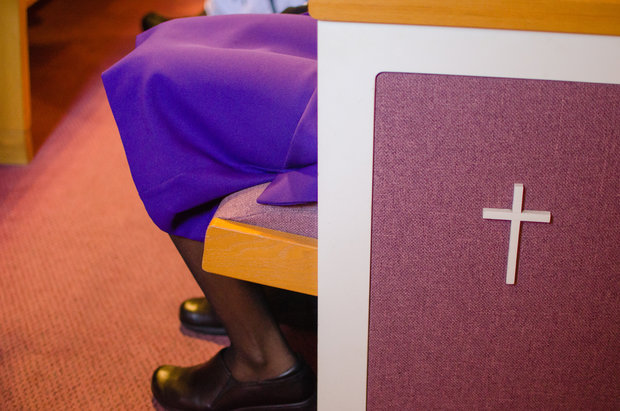
Tonika Lewis Johnson, Everyday Englewood, Sunday Service
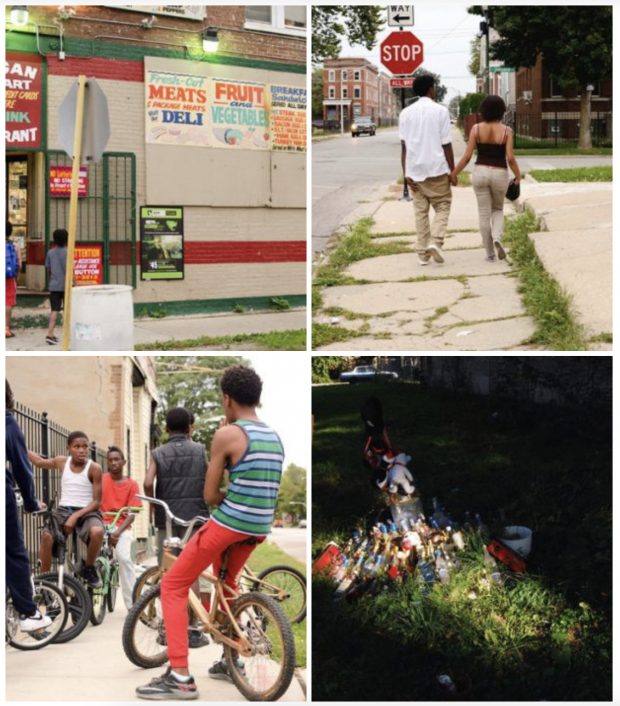
Tonika Lewis Johnson, Everyday Englewood
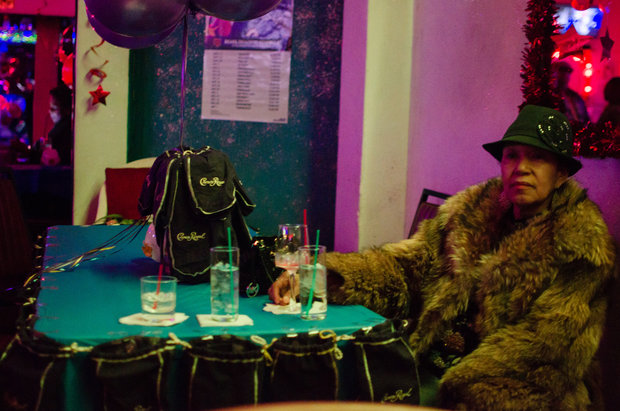
Tonika Lewis Johnson, Everyday Englewood, Crown Royal
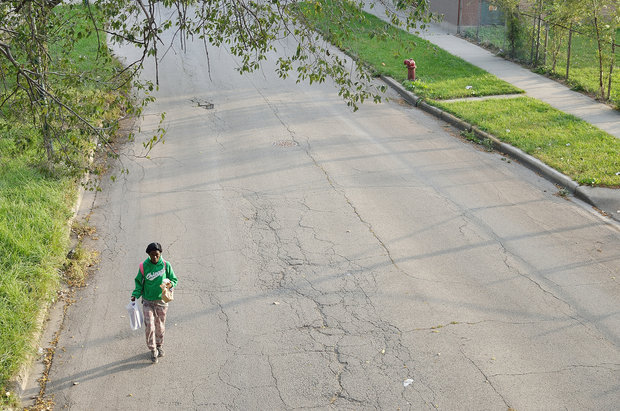
Tonika Lewis Johnson, Everyday Englewood, Streetwalking
